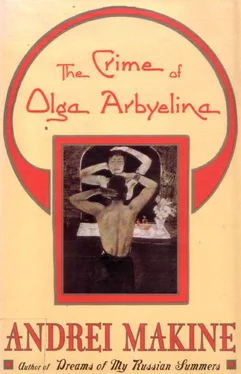Their life, a new version of the masquerades of the old days, will take its tempo now from the impatient hammering at the door when that silk stocking was being slowly drawn up her leg; from the spinning clatter of the roulette wheel; and from the mighty swaying of an immense eucalyptus tree in the rain, that very night outside their window.
And then one day there is the suicide: Khodorsky, whose great friend and accomplice Prince Arbyelin is, sells his childhood home and kills himself. "He drank too much… It was his nerves…," the prince mutters, affecting disdain. But they are aware that this death has banished a whole chapter of their lives into the past. "The end of the Roaring Twenties…" is how she thinks about it later. The truth is that during those frivolous and fugitive years they have simply exhausted their roles. And if they now marry in the very year of Khodorsky's death, it is to give themselves the illusion of an uninterrupted love. They set up house in Paris in winter in an apartment where the light comes in through the windows as if through bottle glass. "A good day for hanging oneself," he declaims, in imitation of the hero of a well-known play; later he takes to repeating this phrase, each time with less irony, soon with aggressive bitterness.
The child is born in 1932, the year in which the Russian émigré Pavel Gorgulov kills the French President, Paul Doumer, with a revolver. The Russians pass on to one another the last words of the condemned man as he is dragged to the scaffold: "All power to the Green Troika!" They say he went mad long before his crime. Yes, the very same year. It is hard not to think about the crashing blade and the spurting blood. She thinks of them when she learns of the child's hemophilia (a tiny scratch that occurs during the birth gives rise to an interminable trickle of blood). She already knows the ingenious cruelty of life: the sound of the guillotine simply lends an artistic touch to the despair that engulfs her.
Despair rapidly becomes their way of life. And when, after six and a half years of this harrowing routine, her husband leaves her, she is secretly grateful to him. For some months she lives through a pain that is finally quite pure, undiluted by any words. In her tragic exaltation she even ends up by justifying his departure ("his betrayal," she had called it earlier): the child's illness made other people's happiness a crime. In all innocence, he himself had become their judge, a silent, daunting witness. Later, after settling in Villiers-la-Forêt, she will come to regret having left Paris, and having refused all help…
Yet it is here, in this sleepy little place, where everyone knows the creak of the door in the only bakery in the lower town, here in the monotony of these long provincial days, that, for the first time since her childhood, she will have the feeling of no longer acting a part; of finally being herself; of returning at last, after a tortuous and futile detour, to the life that was destined for her. In the early twenties the old brewery building, overgrown with weeds and long strands of hops, was the first haven for the small Russian community that had landed at Villiers-la-Forêt. The structure of redbrick, turned brown by more than a century of sun and rain, bore a distant resemblance to a fortress, with its rectangle of walls surrounding an inner courtyard and narrow windows, half loopholes, half fanlights. The proximity of the river that ran behind the building increased this impression of an isolated fortification.
The first arrivals embarked on the adaptation of this place-so little intended for human habitation-with the enthusiastic zeal of pioneers, the excessive confidence of colonists. The manufacturing rooms were divided into unusual apartments, all very long. The southern part of the brewery accommodated the residents of the future retirement home. In an area located above the main entrance, which opened onto the lower town, they installed the first sets of shelves for the library. The building rapidly filled up with occupants and during the first months they believed that this spot, set apart from the town, would witness the birth of some new form of human existence-fraternal, just, almost like a family. An old Russian dream…
As the years went by these first hopes were eroded and the old brewery simply became a dwelling place that was remote and lacking in comfort. People hastened to leave as soon as they had the means and settled either in the narrow streets of the lower town, or, better still, in the town hall district, or, ultimately, in Paris. These different departures charted a kind of hierarchy of personal success, and engendered jealousy and rivalry which were occasionally dispelled by a different kind of departure: death. This would bring everyone together around the coffin of an elderly resident who was about to bid good-bye to the redbrick building. For a time this made all the other removals seem inconsequential and very much the same.
In the end only one visible trace remained of that first great dream: the strange structure some twenty yards long, an annex running alongside the wall of the brewery that faced the river. In their ignorance of architecture, the emigres hoped they could easily double the number of apartments by surrounding the whole building with a long lean-to that would only need a single wall. But the materials turned out to be too expensive; some of the occupants were poor payers, and in the spring the river rose and flooded the section already built. A kind of little dinghy, borne there by the current, appeared washed up against the door. The base of the building was plastered with mud. Now the émigrés understood why the original inhabitants of Villiers-la-Forêt had left unoccupied the broad stretch of waste land between the brewery and the river…
The lean-to house remained unoccupied until the arrival of the Princess Arbyelina in 1939. It was she who cleaned it and fitted it out, planted flowers under the windows and a service tree beside the front steps. And during the years that followed she was never confronted by the rising of the waters.
The old brewery was looked down on because of that very tribal aspect which, in the eyes of the first arrivals, should have ensured its renown. It acquired two ironic nicknames, used interchangeably by the émigrés, which, in time, even the French adopted: "the Golden Horde" and "the Caravanserai." Only a few pieces of machinery, overlaid with several layers of plaster and paint, still recalled the building's original function. The steel bar that ran across the refectory ceiling in the retirement home. The great gear wheel mounted between the windows in one corridor. And, above all, the enormous pulley embedded in the wall of the library. They had not risked removing it from its supports, for fear of seeing a whole story collapse. Moreover, the occupants of the Caravanserai had long since ceased to notice these iron relics here and there thrusting out their useless beams or levers.
Living in that strange annex, Olga had the feeling of being very remote from the communal life of the Caravanserai. Tacked on to the back of the old brewery, her house had no connection with the inner courtyard that was the nerve center of this home for exiles. To go to the library each morning she was obliged to walk beside the wall parallel with the riverbank, and make her way around two corners of the building; even sometimes to make a detour along one of the winding alleys of the lower town, so as to avoid waterlogged areas and piles of rubble overgrown with nettles left over from the abandoned building works. Thus each time she came in by the main gateway she had the illusion of arriving from a long way off. Furthermore, at the time when she settled there, half the apartments, overcrowded in earlier days, were uninhabited. During the war this scattering of the Horde would increase. The only occupants who remained there were those who would never be wealthy enough to leave, like the old cavalry officer; or those who were not yet wealthy enough-like the young artist whose smock was caked with motley layers of paint. Then there were the residents of the retirement home, who did not leave because they were waiting to die there. And some owners of vegetable patches, who were waiting for the harvest. And finally there were some eccentrics who were waiting for nothing and who made no distinction between the Caravanserai, Paris, or Nice. Occasionally, through the library window Olga would see one of these dreamers stopping in the middle of the courtyard and for a long time studying the movement of the clouds.
Читать дальше












